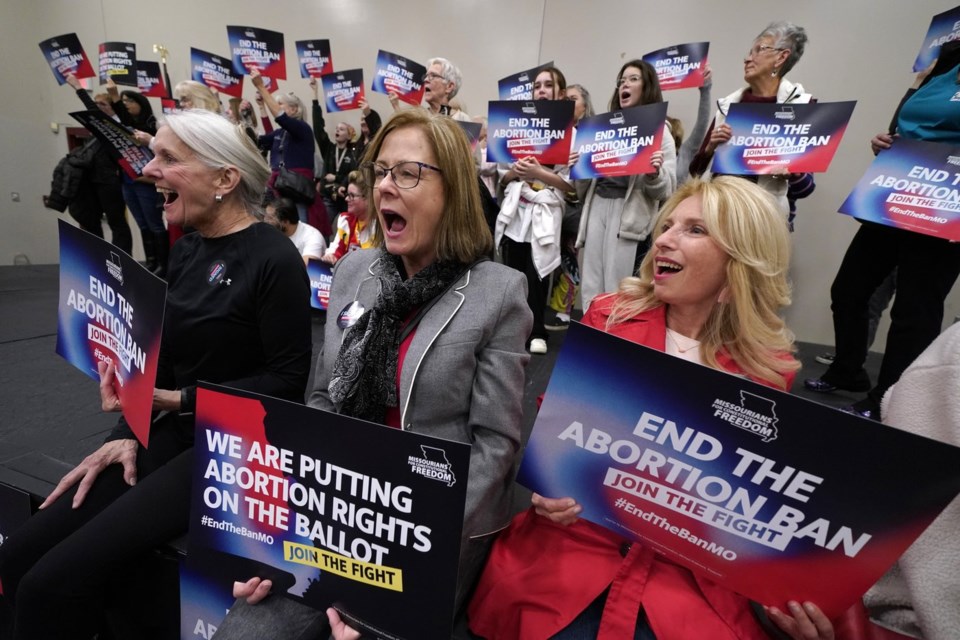OMAHA, Neb. (AP) ŌĆö With ballot deadlines approaching, courts in Nebraska and Missouri are weighing legal arguments that could take measures seeking to expand abortion rights out of the hands of voters.
In Missouri, a day before the state's Supreme Court plans to hear arguments over whether a proposed abortion-rights amendment will go before voters, Republican Secretary of State Jay Ashcroft decertified the measure, removing it from the ballot himself.
Monday's move by Ashcroft, who opposes abortion, is largely symbolic. The Supreme Court is expected to have the final say on whether the measure, which is designed to undo MissouriŌĆÖs near-total abortion ban, should go before voters or not.
Tuesday's Missouri Supreme Court hearing is mere hours before the state's deadline to make changes to this year's ballot.
In Nebraska, the Supreme Court heard arguments Monday in three lawsuits that seek to keep one or both of the stateŌĆÖs competing abortion initiatives off the ballot.
One initiative would enshrine in the Nebraska Constitution the right to have an abortion until viability, or later to protect the health of the pregnant woman. The other would write into the constitution Nebraska's current 12-week abortion ban, passed by the Legislature in 2023, which includes exceptions for rape, incest and the life of the pregnant woman.
Two lawsuits ŌĆö one brought by an Omaha resident and the other by a Nebraska neonatologist who both oppose abortion ŌĆö argue that the measure seeking to expand abortion rights violates the stateŌĆÖs prohibition against addressing more than one subject in a bill or ballot proposal. They say the ballot measure deals with abortion rights until viability, abortion rights after viability to protect the womanŌĆÖs health and whether the state should be allowed to regulate abortion, amounting to three separate issues.
But lawyers opposing the abortion rights measure spent much of their time challenging the language of the proposal, with attorney Brenna Grasz insisting that its wording that ŌĆ£all personsŌĆØ shall have a fundamental right to abortion would extend abortion rights to third parties. An example would be parents seeking to force a minor child to get an abortion.
ŌĆ£Is this a single-subject argument?ŌĆØ Chief Justice Mike Heavican asked.
Attorney Matt Heffron with the , which has filed lawsuits across the country to challenge abortion rights, argued that the Protect Our Rights initiative logrolls competing subjects into one measure. It would force voters who support abortion up to the point of fetal viability to also support abortion after that point to protect the health of the mother, which they may not want to do, he said.
ŌĆ£This is a sea change in the current Nebraska law, which was popularly enacted by representatives, and each one of these should be voted on by the voters separately,ŌĆØ Heffron said.
Heavican countered that ŌĆ£virtually every bill that has gone through the LegislatureŌĆØ dealing with abortion has also included the subjects of exceptions and state regulation.
Heffron answered that lawmakers had the benefit of time and expertise to ŌĆ£hash out the termsŌĆØ of those bills and that voters will go into the voting booth much less informed. But the justices noted that a nearly identical on an abortion rights ballot measure before the conservative Florida Supreme Court earlier this year .
An attorney for the lawsuit challenging the 12-week ban initiative argued that if the high court finds that the abortion rights measure fails the single-subject test, it must also find that the 12-week ban initiative fails it, too.
Attorney David Gacioch, of Boston, said that under the theory floated by opposing attorneys, the 12-week ban measure would loop in at least six separate subjects to include regulating abortion in the first, second and third trimesters and separate exceptions for rape, incest and the life of the mother.
Gacioch acknowledged that insisting on separate ballot measures for each of those issues would be as specious as trying to break down the abortion rights measure into separate issues.
ŌĆ£We donŌĆÖt think thatŌĆÖs what this court has articulated under a single-subject test,ŌĆØ Gacioch said. ŌĆ£We think that would frustrate the rights of the voters to pass constitutional amendments as reflected in the Constitution.ŌĆØ
The state's high court has offered a mixed bag on single-subject law challenges. In 2020, the Nebraska Supreme Court seeking to legalize medical marijuana after finding that its provisions to allow people to use marijuana and to produce it were separate subjects that violated the stateŌĆÖs single-subject rule.
But in July, the high court ruled that a hybrid bill passed by the Legislature in 2023 combining the 12-week abortion ban with another measure to limit gender-affirming health care for minors . That led to a scathing dissent by Justice Lindsey Miller-Lerman, who accused the majority of applying different standards to bills passed by the Legislature and those sought by voter referendum.
The court agreed to expedite Monday's hearing as state law requires the November ballot to be certified by Friday.
Abortion is currently on the November ballot in . Additionally, a would bar discrimination based on pregnancy outcomes but does not mention abortion specifically.
Abortion rights advocates have historically prevailed most of the time itŌĆÖs been before voters ŌĆō including on all since the U.S. Supreme Court overturned Roe v. Wade in 2022 and ended a nationwide right to abortion. Since the ruling, most Republican-controlled states have implemented bans or restrictions ŌĆō including 14 that now bar abortion at all stages of pregnancy.
With such high stakes, there have been court fights over most of the measures. An ruling is letting the state refer to an embryo or fetus as an ŌĆ£unborn human beingŌĆØ in a pamphlet; found paperwork problems with initiative submissions and kept the measure off the ballot. A measure is on the ballot in , but an anti-abortion group is trying to keep the votes from being counted.
ŌĆöŌČ─ö-
Associated Press writer Summer Ballentine contributed to this report from Columbia, Missouri.
Margery A. Beck And Summer Ballentine, The Associated Press



